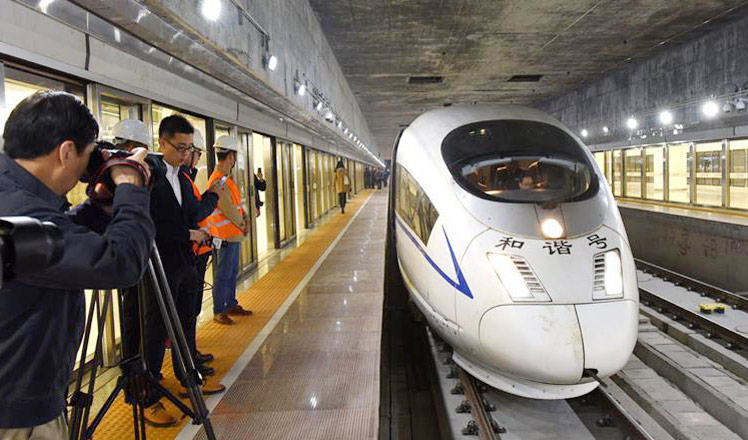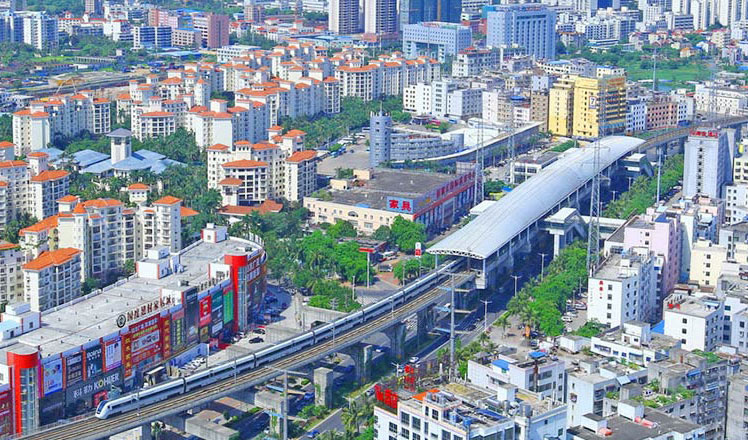Guizhou on the high road to success
Updated: 2016-01-01 07:34
By YANG JUN/ZHAO KAI(China Daily)
|
||||||||
 |
|
Construction workers inspect a bridge that connects the highway between Bijie and Duge in Guizhou province in October. LIU YELIN/CHINA DAILY |
For 53-year-old TangHua, a farmer in Daozhen county, Guizhou province, Chongqing is a big city on the other side of a mountain near his home. It used to take six hours to get there. Not any longer. On the last day of 2015, an expressway linking Daozhen to the rest of the province and beyond opened. It was the last county in Guizhou to be linked to the transportation network.
"The muddy mountainous path to Chongqing will be deserted, as well as many old ways of life," said Tang.
Guizhou's rugged and rocky terrain can make traveling a burdensome task, increases transportation costs and aggravates poverty. By the end of 2015, about 4.9 million people in the province lived on less than $1.25 a day, a sharp reduction from the nearly 12 million in 2011.
"Traffic has been the main issue hindering the province's development," said Wang Bingqing, director of the provincial transportation department.
By the end of 2006, the total length of highways in Guizhou was less than 1,000 kilometers, a level that some coastal provinces in East China had attained by the late 1990s.
In early 2009, Guizhou focused on infrastructure, aiming to weave all of its 88 county-level regions into a highway network by 2015. The total investment was about 410 billion yuan ($68 billion). The province now has 5,126 kilometers of highways.
"The investment and construction scale are both all-time highs in the province's history," Wang said.
Wang Jianguo, chief engineer of the Wengan-Daozhen highway project, said the length of tunnels and bridges accounted for more than 50 percent of the highway, which "increased both budget costs and difficulties for construction".
Compared with areas where the terrain is flat and the highways go across plains, the cost of building a highway in Guizhou is generally about 30 percent higher, Wang said.
Building tunnels and bridges take up a great deal of time as they must be designed and measured to pinpoint accuracy, he added.
China Communications Construction Co will operate the road for 30 years, and use the earnings to repay loans that were spent building it. It will then present the road to the local government.
Li Ruguo, deputy general manager of the company, said this arrangement saves the government money, and ensures construction quality. "About two thirds of Guizhou's highways go through less well-off areas, and increased traffic will greatly boost logistics and attract investment", said Wang Bingqing, head of Guizhou transport department.
"The improvement in infrastructure gives the county government more confidence to attract investors," said Gan Liyi, deputy director of Meitan county's industrial park. "We had lost so many good investors due to the lack of a highway."
The Meitan industrial park was established in 2001, and up until 2010, when the two highways were finished, it had largely remained empty.
Now it's our turn to get businesses to settle in the industrial park, Gan said. "The road changes our status."
The highway network in Guizhou also integrates into regional cooperation in Southwest China that involves the provinces of Sichuan and Yunnan as well as Chongqing municipality, said Deng Ling, a professor of economics and development at Sichuan University.
"Guizhou is a member of the Yangtze River Economic Belt, a regional development plan made by the central government. A developed highway network in Guizhou can make it a regional hub connecting nearby provinces and let productive factors, say resources, funds and man-power penetrate into the less well-off areas in Guizhou," she said.
Li Yang contributed to this story.
- Top planner targets 40% cut in PM2.5 for Beijing-Tianjin-Hebei cluster
- Yearender: Predictions for 2016 through 20 questions
- Asia's largest underground railway station opens in Shenzhen
- Shanghai bans drug-using actors, drivers
- Clamping down to clean up the air
- Yearender: Ten most talked-about newsmakers in 2015
- Over 1 million refugees have fled to Europe by sea in 2015: UN
- Turbulence injures multiple Air Canada passengers, diverts flight
- NASA releases stunning images of our planet from space station
- US-led air strikes kill IS leaders linked to Paris attacks
- DPRK senior party official Kim Yang Gon killed in car accident
- Former Israeli PM Olmert's jail term cut, cleared of main charge

 Yearender: China's proposals on world's biggest issues
Yearender: China's proposals on world's biggest issues
 NASA reveals entire alphabet but F in satellite images
NASA reveals entire alphabet but F in satellite images
 Yearender: Five major sporting rivalries during 2015
Yearender: Five major sporting rivalries during 2015
 China counts down to the New Year
China counts down to the New Year
 Asia's largest underground railway station opens in Shenzhen
Asia's largest underground railway station opens in Shenzhen
 Yearender: Predictions for 2016 through 20 questions
Yearender: Predictions for 2016 through 20 questions
 World's first high-speed train line circling an island opens in Hainan
World's first high-speed train line circling an island opens in Hainan
 'Internet Plus' changes people's lifestyles in China
'Internet Plus' changes people's lifestyles in China
Most Viewed
Editor's Picks

|

|

|

|

|

|
Today's Top News
Shooting rampage at US social services agency leaves 14 dead
Chinese bargain hunters are changing the retail game
Chinese president arrives in Turkey for G20 summit
Islamic State claims responsibility for Paris attacks
Obama, Netanyahu at White House seek to mend US-Israel ties
China, not Canada, is top US trade partner
Tu first Chinese to win Nobel Prize in Medicine
Huntsman says Sino-US relationship needs common goals
US Weekly

|

|







